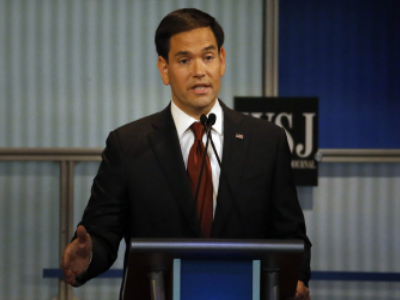The Republicans Revamped
The Republicans take the stage for the fourth time.

Marco Rubio appeals to voters at Tuesday’s GOP Debate.
November 14, 2015
The fourth of the Republican debates diverged from the pattern set by the three preceding it. Tuesday night, Americans able to squint through the usual Trump ruckus witnessed substantive discussion revealing real fractures within the party on big issues. While Trump and Carson remain center stage, experts were most impressed by the performance of Marco Rubio.
Regarding immigration, Jeb Bush went on the offensive, aiming at Trump by insisting that, in order to win, the GOP needs “practical” policies—not mass deportation and a wall. In the sphere of foreign policy, Trump suggested allowing Russia and Vladimir Putin to handle Isis while Rubio and Fiorina continued to plea for US intervention. As usual, Bush spent time attacking President Obama and Democratic candidate, Hillary Clinton. Even if you disagree with the Republican’s political views, this debate certainly proved less petty than the other three Republican debates, and the most triumphant moments of the evening were those avoided. No time was spent discussing Rubio’s finances, and Americans were grateful to be spared yet another foray into Ben Carson’s biography.
Ideological divergences were made most pronounced by an exchange between Rand Paul and Marco Rubio. In discussing foreign policy, Paul asked Rubio, “Can you be a conservative and be liberal on military spending?” Rubio, frightened of upsetting the more spendophobic members of his party, refrained from answering directly by explaining that the safety of Americans is the government’s primary concern; in order to have any economy at all, life must be preserved. Perhaps it was Rubio’s willingness to prioritize reason above strict party adherence that has led commentators to call him the debate’s winner.
